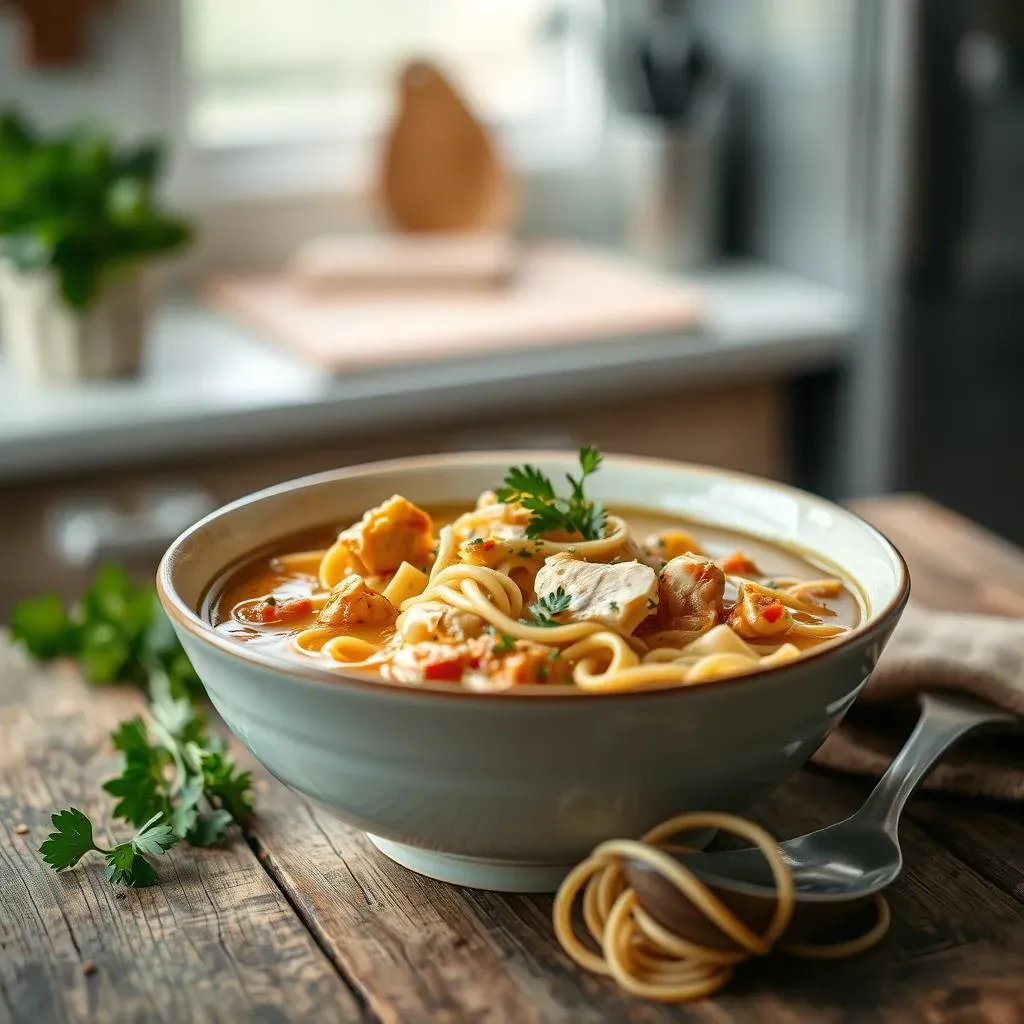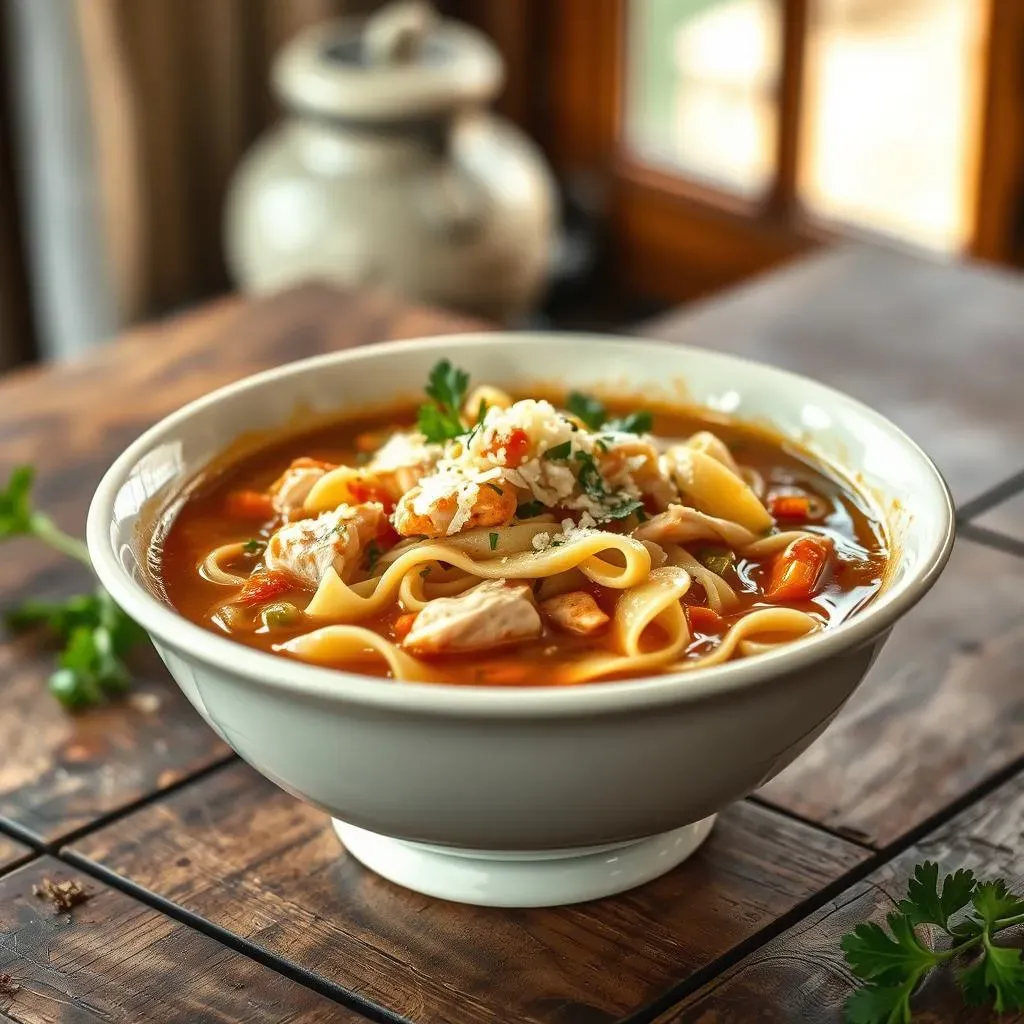Table of Contents
We've all heard the tales: chicken noodle soup, the ultimate comfort food, is now a weight-loss wonder? Sounds too good to be true, right? Well, let's unpack the truth behind the hype surrounding chicken noodle soup for weight loss. This article will explore the science behind this seemingly simple claim, examining whether this beloved soup truly plays a role in shedding those extra pounds. We'll dissect the nutritional content of chicken noodle soup, exploring how its ingredients contribute to—or detract from—weight-management goals. You'll discover how to incorporate chicken noodle soup into a balanced diet and exercise plan for effective and sustainable weight loss. We'll also address common misconceptions and potential pitfalls to avoid, ensuring you get the most out of this culinary approach to weight management. Get ready to ditch the diet fads and discover a potentially delicious path toward your health goals. Let's dive into the broth and find out if chicken noodle soup can truly be your secret weapon in the battle of the bulge!
Understanding Chicken Noodle Soup for Weight Loss

Understanding Chicken Noodle Soup for Weight Loss
Nutritional Breakdown: A Closer Look
Let's be honest, the idea of chicken noodle soup as a weight-loss miracle is a bit of a stretch. However, it's not entirely without merit. A homemade version, packed with lean chicken, plenty of vegetables, and whole-grain noodles, can actually be a pretty healthy part of a balanced diet. The key is portion control and mindful ingredient selection. Forget those heavily salted, processed versions loaded with preservatives; we're talking about a wholesome, homemade concoction.
Think of it as a vehicle for healthy eating. The broth itself is low in calories and provides hydration. Chicken is an excellent source of lean protein, crucial for satiety and muscle maintenance. Vegetables like carrots, celery, and onions add fiber and essential vitamins and minerals. Choose whole-grain noodles over refined options for added fiber. The combination of protein and fiber keeps you feeling full for longer, reducing overall calorie intake.
Nutrient | Benefits |
|---|---|
Protein (from chicken) | Promotes satiety, supports muscle growth |
Fiber (from vegetables and whole-grain noodles) | Aids digestion, keeps you feeling full |
Vitamins and Minerals (from vegetables) | Supports overall health and well-being |
Calorie Control and Portion Sizes
Even a healthy homemade chicken noodle soup can contribute to weight gain if you eat massive bowls of it every day. Remember, weight loss is all about a calorie deficit – burning more calories than you consume. While chicken noodle soup can be a low-calorie option compared to other meals, it's still important to be mindful of portion sizes.
Think of it like this: a single serving of your carefully crafted soup can be a satisfying and nutritious part of a balanced meal plan. However, consuming three or four large bowls daily will likely negate any potential weight-loss benefits. Pay attention to your body’s hunger cues and adjust your portion size accordingly. Don’t be afraid to use a smaller bowl or split a larger serving into two meals.
- Use smaller bowls to control portions.
- Listen to your body's hunger cues.
- Consider splitting a large serving into two meals.
Beyond the Bowl: A Holistic Approach
It's crucial to understand that chicken noodle soup alone won't magically melt away the pounds. It's a tool, not a solution. To achieve sustainable weight loss, you need a holistic approach that combines a balanced diet with regular exercise. Think of chicken noodle soup as one piece of a larger puzzle.
Incorporate it into a well-rounded meal plan that includes plenty of fruits, vegetables, lean proteins, and whole grains. Pair it with regular physical activity tailored to your fitness level. This integrated approach will yield much more effective and lasting results than relying solely on a single food item, no matter how nutritious it may be. Remember, consistency and a long-term commitment are key to achieving your weight goals.
"Weight loss is a marathon, not a sprint. Be patient, consistent, and celebrate small victories along the way." - Unknown
The Science Behind Chicken Noodle Soup and Weight Management

The Science Behind Chicken Noodle Soup and Weight Management
The Role of Calories and Macronutrients
Let's get down to the nitty-gritty: weight loss boils down to a calorie deficit. Chicken noodle soup, in its healthiest form, can contribute to this deficit. A bowl of homemade soup, made with lean chicken breast, plenty of vegetables, and a small amount of whole-grain noodles, is relatively low in calories compared to many other meals. The protein in the chicken helps you feel full and satisfied, which can curb your appetite and prevent overeating later in the day.
The fiber from the vegetables and noodles also plays a significant role in satiety. Fiber adds bulk to your meal, slowing digestion and prolonging the feeling of fullness. This can be particularly helpful in managing weight, as it helps to prevent those mid-afternoon cravings that often lead to unhealthy snacking. The balance of protein and fiber is key to making this soup a weight-loss-friendly option.
Macronutrient | Role in Weight Management |
|---|---|
Protein | Increases satiety, supports muscle mass |
Fiber | Promotes fullness, regulates digestion |
Carbohydrates | Provide energy, choose complex carbs for sustained energy |
The Impact of Soup Consumption on Weight Loss
Several studies suggest that consuming soup, particularly before a meal, can aid in weight loss. The theory is that the soup fills you up, reducing your overall calorie intake at the main meal. This effect is amplified by the combination of protein and fiber found in a well-made chicken noodle soup. The increased satiety helps regulate your appetite, preventing overeating throughout the day.
However, it's crucial to remember that this isn't a magic bullet. The type of soup matters significantly. A broth-based soup, rich in vegetables and lean protein, is far more beneficial than a creamy, high-calorie soup. The portion size is also critical; consuming excessive amounts of even healthy soup will lead to calorie excess, negating any potential weight-loss benefits. Remember, moderation and mindful eating are key.
- Choose broth-based soups over creamy options.
- Control portion sizes to avoid excess calories.
- Pair soup with a balanced meal plan and exercise.
Beyond Calories: The Importance of Micronutrients
While calorie control is paramount for weight loss, we shouldn't overlook the importance of micronutrients. A well-made chicken noodle soup is packed with vitamins and minerals from the vegetables. These micronutrients are essential for various bodily functions, including metabolism and energy production. A diet rich in these nutrients can support your overall health and well-being, which indirectly contributes to successful weight management.
Think of it this way: a nutrient-rich diet fuels your body more efficiently, promoting a healthier metabolic rate and supporting sustained energy levels. This is crucial for maintaining a consistent exercise routine, which is essential for long-term weight loss. So, while the calorie deficit is the primary driver of weight loss, the supporting role of micronutrients shouldn't be underestimated.
"A healthy outside starts from the inside." - Robert Urich
Creating a WeightLoss Plan with Chicken Noodle Soup

Creating a WeightLoss Plan with Chicken Noodle Soup
